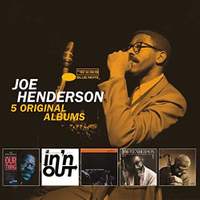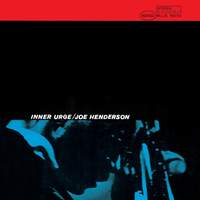Classic Recordings,
Joe Henderson - Inner Urge
 It’s a tricky business, trying to describe how an individual player sounds, especially when they can’t be credited with having broken the mould in any particularly dramatic way. For trailblazers such as John Coltrane, whose ground-breaking style was neatly described by Ira Gitler in 1958 as like ‘sheets of sound’, the shock of the new did half the work, or Albert Ayler, an artist attributed one of my favourite descriptions, by poet Ted Joans, who famously wrote that Ayler’s sax sounded ‘like screaming the word 'f**k' in Saint Patrick's Cathedral on a crowded Easter Sunday.’ For an artist like Joe Henderson, whose unique sound slides between styles that had already been well established before he found his own voice, there aren’t any such soundbites. As a rough guide, Henderson found a niche somewhere between the Sonny Rollins, John Coltrane and his contemporary Wayne Shorter, but these comparisons do a disservice to one of the most enduring players of his generation. Better to get on and listen to one of his undoubted masterpieces: Inner Urge.
It’s a tricky business, trying to describe how an individual player sounds, especially when they can’t be credited with having broken the mould in any particularly dramatic way. For trailblazers such as John Coltrane, whose ground-breaking style was neatly described by Ira Gitler in 1958 as like ‘sheets of sound’, the shock of the new did half the work, or Albert Ayler, an artist attributed one of my favourite descriptions, by poet Ted Joans, who famously wrote that Ayler’s sax sounded ‘like screaming the word 'f**k' in Saint Patrick's Cathedral on a crowded Easter Sunday.’ For an artist like Joe Henderson, whose unique sound slides between styles that had already been well established before he found his own voice, there aren’t any such soundbites. As a rough guide, Henderson found a niche somewhere between the Sonny Rollins, John Coltrane and his contemporary Wayne Shorter, but these comparisons do a disservice to one of the most enduring players of his generation. Better to get on and listen to one of his undoubted masterpieces: Inner Urge.
Coming from Ohio, Joe Henderson spent the early sixties in the US Army, where he won first place in a talent show that sent him on a world tour, entertaining the troops. This led to him meeting Kenny Drew and Kenny Clarke in Paris, who encouraged him to make his way to New York in 1962, meeting veteran trumpeter Kenny Dorham, who took him to see Dexter Gordon at Birdland. Gordon invited Henderson up on stage, kick-starting a career that quickly led to him establishing himself as one of the most popular tenors-for-hire at Blue Note, making consistently brilliant contributions to some of the key albums of the era: Lee Morgan’s Sidewinder, Andrew Hill’s Point of Departure, Larry Young’s Unity. He also embarked on a series of albums as leader, the excellent debut Page One, followed by Our Thing and In and Out, all of which prominently feature Kenny Dorham as a player and composer.

1965’s Inner Urge stands out not only from Henderson’s discography, but also as one of the finest albums of the era. With inspired support from McCoy Tyner and Elvin Jones (both having recently abandoned Coltrane as he continued his expedition into the avant-garde), and bassist Bob Cranshaw (long-time associate of Sonny Rollins), the album balances structure and melodic invention with more exploratory textures. The title track features Henderson at his most exciting, taking his memorable theme off on wild tangents, occasionally threatening to take things into free territory but ultimately obeying his ‘inner urge’ as a great melodicist. Tyner matches Henderson for intensity, clearly enjoying being able to test the very rules that Coltrane had seemingly discarded altogether, with those unmistakable Tyner ambiguous chords ominously hanging over the proceedings. The musical bond between these two players would two years later result in the ebullient Passion Dance on The Real McCoy. Another Henderson original, Isotope, is just as compelling, with a lopsided theme worthy of Monk giving the group plenty to trip over. Jones makes the most of the stop-starts with glorious fills, especially in a dialogue section with Henderson. El Barrio opens with a clarion call from Henderson, before working through some quite turbulent music, kept in check by Tyner. The final two tracks, You Know I Care and Night and Day are lighter, yet streetwise, takes on standards.
 Inner Urge, Our Thing and In and Out are included in a Blue Note mid-price boxset, which also features both volumes of State of the Tenor, a trio date with Ron Carter and Al Foster, recorded live at the Village Vanguard in 1985. Very much in the tradition of Sonny Rollins’s famous Vanguard recordings, Henderson brings his own mix of lyricism and fire to these sessions, and was an indication that he had made his way through the seventies fusion era unscathed (unlike many of his peers). In the early nineties Henderson signed to Verve and enjoyed an unexpected late-career boost with a series of releases that were both a commercial as well as artistic success. The first album for Verve, Lush Life: The Music of Billy Stayhorn from 1992, is a warm and inviting record full of invention, allowing us to marvel at how consistent a player Henderson still was in his final decade.
Inner Urge, Our Thing and In and Out are included in a Blue Note mid-price boxset, which also features both volumes of State of the Tenor, a trio date with Ron Carter and Al Foster, recorded live at the Village Vanguard in 1985. Very much in the tradition of Sonny Rollins’s famous Vanguard recordings, Henderson brings his own mix of lyricism and fire to these sessions, and was an indication that he had made his way through the seventies fusion era unscathed (unlike many of his peers). In the early nineties Henderson signed to Verve and enjoyed an unexpected late-career boost with a series of releases that were both a commercial as well as artistic success. The first album for Verve, Lush Life: The Music of Billy Stayhorn from 1992, is a warm and inviting record full of invention, allowing us to marvel at how consistent a player Henderson still was in his final decade.
You couldn't ask for a better entry point into Henderson's music than this boxset.
Available Format: 5 CDs
The download version.
Available Formats: MP3, FLAC




